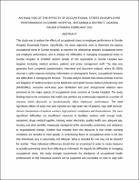| dc.description.abstract | This study was to analyse the effects of occupational stress on employee performance in Gombe Hospital, Butambala District. Specifically, the study objectives were to determine the aspects occupational stress in Gombe Hospital; to examine the relationship between occupational stress and employee performance; and to analyse the difficulties in managing occupational stress in Gombe Hospital. A stratified random sample of 100 respondents in Gombe Hospital was targeted, including medical workers, patients and senior management staff. The data was generated from completed questionnaires, interviews and document analysis, where 95 (95%) returned a valid response including information on demographic factors, occupational stressors and difficulties in managing the burnout. The data analysis showed that continual threat of arrest and litigation of medical workers by the Medicines and Health Service Delivery Monitoring Unit (MHSDMU), excessive work-load, poor facilitation and poor interpersonal relations were perceived as the major aspects of occupational stress common at Gombe Hospital. The study findings lead to the conclusion that health care workers are continuously exposed to a number of stressors which physically or psychologically affect employees’ performance. The most significant effects of stress that were reported are high death rate of patients, high staff turnover, chronic absenteeism of medical workers, high patients’ complaints and dissatisfaction. The most significant difficulties are insufficient resources to facilitate workers with enough tools, equipment, drugs, medical supplies, training, water, electricity, quality health care, adequate pay, housing and other benefits; inadequate managerial skills; personality constraints; and resistance to organisational change. Another fact revealed from this discourse is that certain working conditions are stressful to most people. A contributing factor to occupational stress is the fact that individuals vary in personality and lifestyle. What is stressful for one may not be stressful for another. These individual differences should then be scrutinized in order to create measures to actually preventing stress from affecting an individual. As regards the difficulties in managing occupational stress, this study strongly recommends the indulgence of occupational health professionals so that individual workers can be supported and counselled on how to cope with stress. The management is urged to strive for autonomous resource mobilization capacity, which could be achieved if the hospital managers solicit alliance or working partnership with charitable international NGOs to boost the local resource envelope. This could help to locally recruit more staff and improve on their pay, hence deal with the various aspects of occupational stress and minimize its effect on employee performance. The strategy could also help the managers to prevent stress from occurring by identifying situations like potential stressors, risk assessment, and take necessary steps to reduce stress that would otherwise negate the performance of employees in Gombe Hospital. | en_US |

